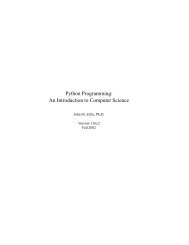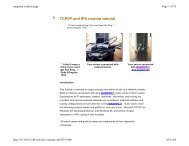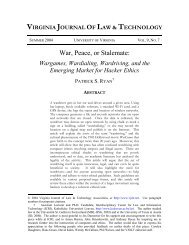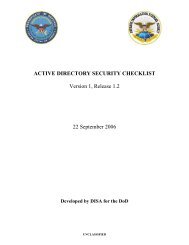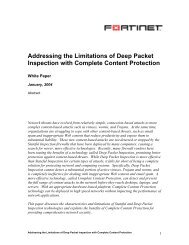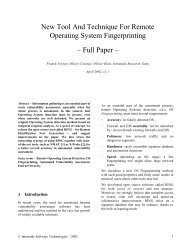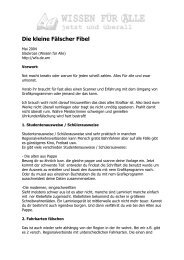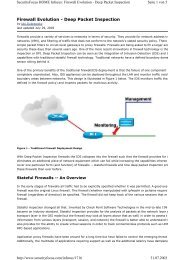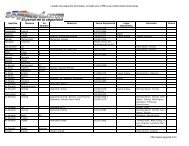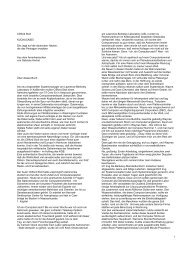EtherLeak: Ethernet Frame Padding Information ... - Leet Upload
EtherLeak: Ethernet Frame Padding Information ... - Leet Upload
EtherLeak: Ethernet Frame Padding Information ... - Leet Upload
Create successful ePaper yourself
Turn your PDF publications into a flip-book with our unique Google optimized e-Paper software.
10<br />
interrupt that clears the Tx queue, and only then set tx_full.<br />
So we do this in two phases. */<br />
if (++tp->cur_tx - tp->dirty_tx >= NUM_TX_DESC) {<br />
set_bit(0, &tp->tx_full);<br />
if (tp->cur_tx - (volatile unsigned int)tp->dirty_tx <<br />
NUM_TX_DESC) {<br />
clear_bit(0, &tp->tx_full);<br />
netif_unpause_tx_queue(dev);<br />
} else<br />
netif_stop_tx_queue(dev);<br />
} else<br />
netif_unpause_tx_queue(dev);<br />
dev->trans_start = jiffies;<br />
if (tp->msg_level & NETIF_MSG_TX_QUEUED)<br />
printk(KERN_DEBUG"%s: Queued Tx packet at %p size %d to slot<br />
%d.\n",<br />
dev->name, skb->data, (int)skb->len, entry);<br />
}<br />
return 0;<br />
The code here is similar to the previous example differing only in the check to ensure<br />
that the buffer containing the frame is properly aligned. If the address of the buffer is not<br />
aligned on a four byte boundary (line 01) then the frame will be copied to a buffer<br />
maintained by the device driver which is aligned (line 02). The address of the aligned<br />
buffer, either the driver’s alignment buffer (line 03) or the original buffer (line 05), is<br />
passed to the card. The card is informed of the address of the frame buffer and the<br />
length of the frame at line 06. The greater of the two values, ETH_ZLEN or skb->len, is<br />
passed to the card as the size of the frame to transmit (line 06).<br />
The pad bytes will always contain the contents of earlier packets and therefore present a<br />
great likelihood of revealing sensitive data.<br />
3.3.2 <strong>Frame</strong> Capture<br />
The following example was produced by a Linux 2.4.x machine with a Xircom PCMCIA<br />
network card using the xirc2ps_cs.c device driver.<br />
The following tcpdump traces clearly demonstrates the information leakage problem.<br />
The information leaked is HTTP-based traffic.<br />
14:49:09.306008 192.168.222.11 > 192.168.222.25: icmp: echo reply (DF) (ttl<br />
128, id 577, len 28)<br />
0x0000 4500 001c 0241 4000 8001 bb29 c0a8 de0b E....A@....)....<br />
0x0010 c0a8 de19 0000 48f9 b406 0300 0400 0000 ......H.........<br />
0x0020 0004 0650 5542 4c49 4303 4e4c 5307 ...PUBLIC.NLS.<br />
14:50:46.313706 192.168.222.11 > 192.168.222.25: icmp: echo reply (DF) (ttl<br />
128, id 854, len 28)<br />
0x0000 4500 001c 0356 4000 8001 ba14 c0a8 de0b E....V@.........<br />
0x0010 c0a8 de19 0000 e7f8 b406 6400 4b43 4c41 ..........d.KCLA<br />
0x0020 4e47 2e44 4c4c 3c00 0090 2787 ce24 NG.DLL




